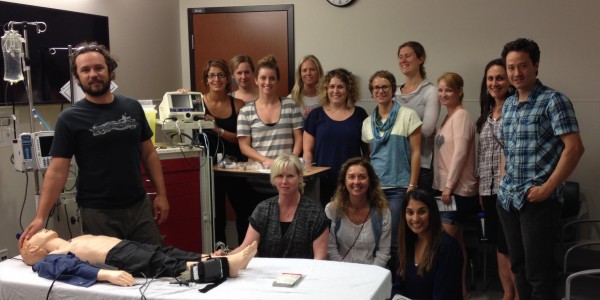Coastal Simulation Program in full swing at LGH
Pediatrics Educator Ruby Bahia openly admits to being “incredibly intimidated” when she walked into her first Simulation Learning Program earlier this year at Lions Gate Hospital.
“I sat amongst some of the most amazing doctors, educators and nurses from all different areas throughout Lions Gate Hospital,” says Ruby. “As the two-day course unfolded and through many discussions and team building activities, I began to feel confident and realized that I was an important member of the team, too, as each healthcare member at LGH is.”
With the Coastal Simulation Program at LGH in full swing and here to stay, Ruby and 24 other LGH clinicians have been able to take courses in the Kevin and Patricia Huscroft Coastal Simulation centre in the HOpe Centre, getting to know the Sim family manikins – SimBaby, SimJunior and SimMan 3G (aka ACE), altogether costing roughly $225,000.
Simulation has long been recognized as a key learning method in high-risk professions, such as airline pilots. While using simulation for health care professionals would seem a natural fit, the challenge has always been making simulations realistic and meaningful without “real” patients.
Manikins can talk, cough and sweat
Coastal’s high-fidelity manikins, which are equipped with internal computers and can be made to talk, cough, sweat etc, are filling a vital educational need – providing clinicians with realistic situations in a safe and empowering environment to better prepare them for the real event.
“The courses I took were exciting and motivating and encouraged me to step out of my comfort zone and take my learning and teaching to a whole other level,” says Ruby.
SIM family doing weekly rounds in ED for mock traumas
Over the last few months, the manikins have also been doing the rounds at LGH where they are in weekly use in the Emergency Department for mock traumas, monthly use in ICU, monthly use in Pediatrics and twice a month for mock code blue on the inpatient units . The goal is to take the program to all major clinical areas.
“Once staff tastes it, they want more,” says Karen Schafer, Education Lead, Simulation Strategy, Clinical Education and Collaborative Practice (VCH).
Ruby agrees. She recently became a Neonatal Resuscitation Provider (NRP) instructor. She took the Simulation Learning Strategies course to learn how to ask the right questions to facilitate a discussion during her NRP courses.
“I learned excellent strategies but I also learned the importance of team-work, equality, communication and, most importantly, having fun,” says Ruby.
“Overall, I believe many people – healthcare workers and patients – will benefit from the SIM Program at LGH. We are incredibly lucky to have this program at LGH and to have someone like Karen who is so passionate about the SIM Program that it has motivated all of us on the third floor to want to learn and practice new skills.”
The course scheduled for Nov. 4 and 5th is fully booked, but Karen is already planning another one early in the New Year.
And starting in early December, Karen will pack up Ace the SimMan and take him on the road for a pilot outreach trip. The site has yet to be determined.

